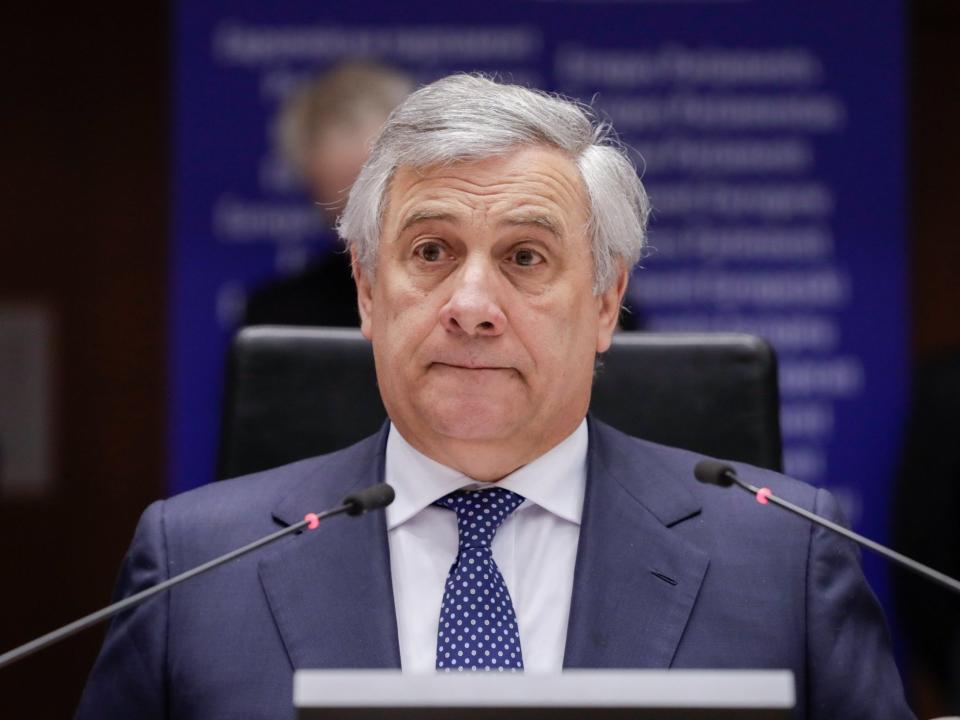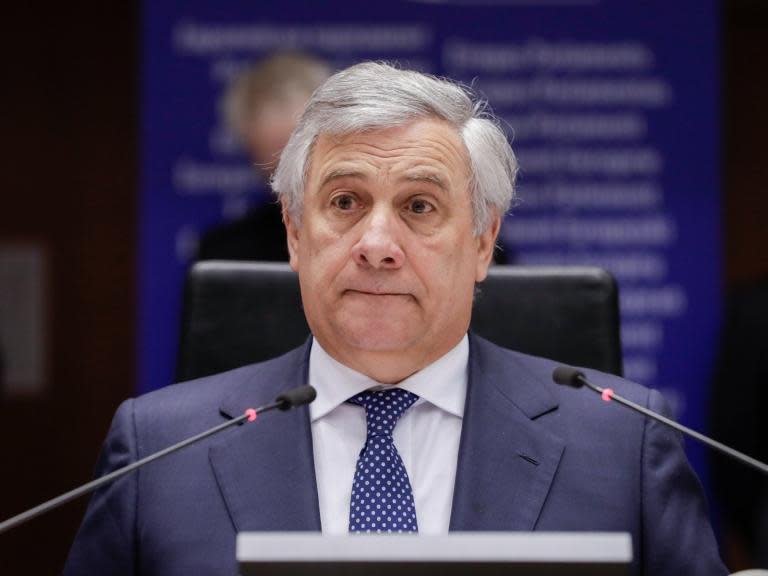EU Parliament chief Tajani faces calls to resign over ‘nationalist’ comment about Italy war territories
Lawmakers from Slovenia and Croatia have called for the resignation of the president of the European Parliament over provocative remarks that they say were intended to arouse nationalist sentiments.
The president, Antonio Tajani, made the comments at a memorial service in Basovizza, Italy, earlier this month for Italians who had been living in Slovenia and Croatia and were murdered at the end of World War II.
Mr Tajani ended his speech by saying, “Long live Italian Istria and Italian Dalmatia” — regions that have been territories of Italy at various times, including during the war, but are today part of Slovenia and Croatia.
“I was shocked,” said Ivan Jakovcic, a Croatian representative to the European Parliament who is from the Istrian Peninsula. “It is unheard-of that the head of the European Parliament would utter something like that.”
Many Croatians and Slovenians recall the brutality with which Italy governed their territory, and they are extremely sensitive to remarks like Mr Tajani’s that discount the repression they endured.
The dispute has reopened old wounds that trace back more than 70 years, and involves bitter memories and atrocities committed both by the Italian occupiers during the war and by the Croatian and Slovenian populations in its aftermath.
Mr Tajani’s apparent appeal to Italian historical resentments comes as nationalism is on the rise throughout Europe.
Some prominent European lawmakers introduced a petition last week demanding Mr Tajani’s resignation.
“His statement was dangerous because he used the language of revisionists, and portrayed only one side of history,” said Tanja Fajon, a representative of Slovenia who signed the petition.
Mr Tajani has apologised several times, but he also insists he was misinterpreted and it was not his intention to make territorial claims.
“I was referring to the Istrian and Dalmatian Italian-language exiles, their children and grandchildren,” he said in one of his apologies. He was referring to Italians who were forced from the regions after Italy surrendered to Allied forces at the end of World War II.
Mr Tajani, who has refused to resign, declined a request for an interview.
After the end of World War II, ethnic Italians living in the coastal areas of Istria and Dalmatia — even those who had called those areas home for centuries — were viewed as collaborators with fascist Italy; most were either expelled or killed.
Some were thrown into deep limestone caves and pits that dot the Adriatic Coast. Many people in Italy refer to the mass killings simply as “foibe,” or caves. A joint Italian-Slovenian historical committee estimated that as many as 4,000 ethnic Italians were killed.
“In Italy, for the past 20 to 25 years, there has been a reinterpretation of their history — especially as it concerns Rijeka and Istria,” said Franko Dota, a Croatian historian. Rijeka is in Croatia.
“During the Cold War, the issue of territories was not discussed especially when it was associated to fascism and the fact that Italy was on the wrong side of history,” Mr Dota said. “After the Cold War, it became easier for nationalist historians to promote a different interpretation of what they saw as injustices perpetrated against Italians in these areas.”
But that narrative, Mr Dota and others say, ignores the oppression endured by Slovenians and Croatians when Italy controlled their territory. “The experience people remember most from this period is that of Italian fascist expansionism, which many know as a period of repression over the Slovene and Croat population,” he said.
Tomislav Jakic, a Croatian political analyst, said Mr Tajani’s remarks were “not an accident, a slip of the tongue.”
“It is a reflection of the political scene in Italy today, and is in line with the shift to the right of the entire European political scene.” he said. “It seems we are headed towards a situation where it is all right to question all the norms that were set in Europe since 1945.”
In some sense, the debate reflects a tendency of nationalist politicians to reinterpret their countries’ struggles, even when their nations fought on the side of Italy and Germany, in a more favourable light.
Some Slovenian and Croatian officials say they think Mr Tajani’s remarks were aimed primarily at domestic Italian politics. Mr Tajani’s party, Forza Italia, has lost popularity and is hoping to join forces with the far-right, nationalist League party of Matteo Salvini, Italy’s most powerful politician.
And with elections for the European Parliament in May, confrontations along the right-left fault line are likely to increase. European politics in Brussels is waged between the two biggest coalitions of national parties: the European People’s Party, a centre-right alliance with the largest bloc of lawmakers — including Mr Tajani — and the left-leaning Socialists and Democrats faction.
In condemning Mr Tajani’s statements, the head of the Socialists and Democrats faction, Udo Bullmann of Germany, said the president of the European Parliament should be a unifier, rather than a divider.
“If President Tajani wants to be a nationalist politician rather than a statesman, he should leave his role as president of the European Parliament,” Mr Bullmann said.
The European People’s Party, or EPP, has not done anything “to stop the populist and right-wing forces that are trying to undermine democracy and rule of law, equality and solidarity in Europe,” Mr Bullman said. “In fact, the EPP is courting these people in the false belief that it will help them gain votes from the far right.”
The New York Times

 Yahoo News
Yahoo News 

